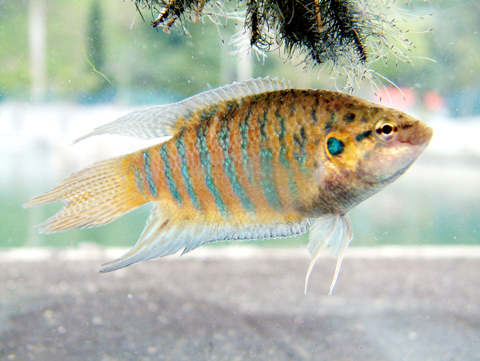Paradise fish — a small freshwater fish once commonly found in rivers and creeks around Taiwan — may be nearly extinct in the wild, but one fish breeding station has been successfully breeding the species in captivity.
Lin Hung-kuei (林鴻桂), director of Hualien County’s Fish Breeding Propagation Station, said that pollution and competitive non-indigenous fish had driven the paradise fish from its natural breeding places and made it almost impossible to reintroduce it into the wild to replenish stocks.
After the fish was designated by the government as a protected species in August 1990, the station began studying ways to help revive the species and has successfully bred the fish in a controlled environment and preserved the species, which is endemic to Taiwan.

PHOTO: CNA
The breeding technique is now being shared with schools for use as a tool in experimental ponds, Lin said.
Paradise fish, also known as Macropodus opercularis, are approximately 6cm long and live in shallow freshwater environments where water flow is gentle.
The fish breeding station said that although they are rarely seen in the wild, with their green-blue and light red stripes, paradise fish are popular in private fish tanks.
Lin said that most paradise fish traded in the market were bred artificially, while some are imported from Malaysia.
Aside from being appreciated for its appearance, the fish can also be used to eradicate mosquitoes as it eats their larva.

An undersea cable to Penghu County has been severed, the Ministry of Digital Affairs said today, with a Chinese-funded ship suspected of being responsible. It comes just a month after a Chinese ship was suspected of severing an undersea cable north of Keelung Harbor. The National Communications and Cyber Security Center received a report at 3:03am today from Chunghwa Telecom that the No. 3 cable from Taiwan to Penghu was severed 14.7km off the coast of Tainan, the Ministry of Digital Affairs said. The Coast Guard Administration (CGA) upon receiving a report from Chunghwa Telecom began to monitor the Togolese-flagged Hong Tai (宏泰)

A cat named Mikan (蜜柑) has brought in revenue of more than NT$10 million (US$305,390) for the Kaohsiung MRT last year. Mikan, born on April 4, 2020, was a stray cat before being adopted by personnel of Kaohsiung MRT’s Ciaotou Sugar Refinery Station. Mikan was named after a Japanese term for mandarin orange due to his color and because he looks like an orange when curled up. He was named “station master” of Ciaotou Sugar Refinery Station in September 2020, and has since become famous. With Kaohsiung MRT’s branding, along with the release of a set of cultural and creative products, station master Mikan

RISING TOURISM: A survey showed that tourist visits increased by 35 percent last year, while newly created attractions contributed almost half of the growth Changhua County’s Lukang Old Street (鹿港老街) and its surrounding historical area clinched first place among Taiwan’s most successful tourist attractions last year, while no location in eastern Taiwan achieved a spot in the top 20 list, the Tourism Administration said. The listing was created by the Tourism Administration’s Forward-looking Tourism Policy Research office. Last year, the Lukang Old Street and its surrounding area had 17.3 million visitors, more than the 16 million visitors for the Wenhua Road Night Market (文化路夜市) in Chiayi City and 14.5 million visitors at Tainan’s Anping (安平) historical area, it said. The Taipei 101 skyscraper and its environs —

Taiwan on Friday said a New Zealand hamburger restaurant has apologized for a racist remark to a Taiwanese customer after reports that it had first apologized to China sparked outrage in Taiwan. An image posted on Threads by a Taiwanese who ate at Fergburger in Queenstown showed that their receipt dated Sunday last week included the words “Ching Chang,” a racial slur. The Chinese Consulate-General in Christchurch in a statement on Thursday said it had received and accepted an apology from the restaurant over the incident. The comment triggered an online furor among Taiwanese who saw it as an insult to the